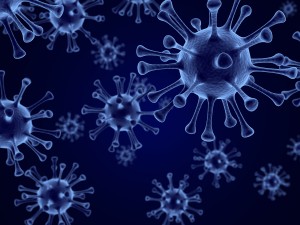 The average person has about 2 or 3 pounds of microbes in their body. Microbes are tiny organisms that live primarily in the intestines. Dr. Lee Kaplan gave a presentation at The Obesity Society’s annual scientific meeting, where he discussed recent studies that indicate microbes may play an interesting role in weight and weight loss. Dr Kaplan explained that we know microbes influence our energy balance and glucose, and we influence the microbes in return, especially by the diet we eat. When a person changes their diet, they can change the microbes in their intestinal tract. Dr Kaplan showed evidence that within 7 days of introducing a “western” diet (high fat/sugar, red meat, and refined grains) a change is seen in the microbes that is considered a stable and long-lasting change.
The average person has about 2 or 3 pounds of microbes in their body. Microbes are tiny organisms that live primarily in the intestines. Dr. Lee Kaplan gave a presentation at The Obesity Society’s annual scientific meeting, where he discussed recent studies that indicate microbes may play an interesting role in weight and weight loss. Dr Kaplan explained that we know microbes influence our energy balance and glucose, and we influence the microbes in return, especially by the diet we eat. When a person changes their diet, they can change the microbes in their intestinal tract. Dr Kaplan showed evidence that within 7 days of introducing a “western” diet (high fat/sugar, red meat, and refined grains) a change is seen in the microbes that is considered a stable and long-lasting change.
In looking at microbes in relation to obesity, researchers wondered if the microbes in the intestines of animals who are obese largely because of genetics, would see the same changes in microbes as in the intestines of animals with obesity caused by dietary changes. From their studies, they found evidence that the same changes are found in microbes regardless of whether obesity is more related to genetic factors, or dietary factors.
To further understand microbes, researchers compared mice from 3 groups:
1. Germ-Free mice (born and raised in a sterile environment, and had no microbes),
2. Microbe Recipients (mice who were germ free, and then given microbes from other mice)
3. Conventional mice (born and raised in a typical environment and had natural microbes)
The researchers found the germ-free mice (those with no microbes) had the lowest rates of obesity. The Microbe Recipient mice increased their rates of obesity after the introduction of microbes, almost to match the conventional mice. It was very interesting to note that even though there was an increase in obesity in the Microbe Recipient group, there was also a decrease in food intake for these mice.
The next question Kaplan discussed was: would it make a difference if we transfer microbes to the germ free mice, from either a lean donor or an obese donor? Their study results showed that yes, there is a difference: the body fat of the recipient mice was significantly less when the mice were given microbes from a lean mouse; the body weight and fat of the recipient mice was significantly higher when the microbes can from an obese donor mouse. It did not matter if the obese donor mouse had more of a genetically-induced obesity, or a dietary-induced obesity. In both cases, the microbes caused weight gain in the recipient mice. This weight gain is especially interesting because there was no significant difference in food consumption, after the microbes were transferred. The mice gained weight for a reason other than consuming more calories.
Kaplan says it’s likely that the microbes are signaling from gut to the liver, adipose tissue, and to other parts of the body that regulate weight. Microbes regulate several things known to be related to weight: inflammatory signals, short chain fatty acids (SCFA’s) and bile acids. In turn, bile acids can affect adiposity and GLP-1, and energy expenditure (calories burned). So even though it is not clear yet exactly what the microbes are doing, they likely have a complex role in weight and obesity.
Dr Kaplan went on to discuss his research on the effect that gastric bypass surgery might have on microbes. An important effect of gastric bypass on expended energy is that the surgery has the opposite effect of what happens during restrictive dieting: after gastric bypass, expended energy increases. He found that in his animal studies that Roux-en-y gastric bypass changes microbes rapidly (within a week) and profoundly. Could these changes be because of the weight loss? No, he says, these changes are different from what happens to microbes from weight loss caused by dietary changes. He tested both a high fat and a low fat diet, and the microbe changes were seen in both cases, leading to his conclusion that the changes seen in microbes were independent of diet.
Kaplan then studied what happens when germ-free mice were given microbes from mice who underwent gastric bypass. He found the recipient mice lost weight after receiving the microbes, even though there was no difference in their food intake. He believe that the microbes from the gastric bypass mice may be transmitting a signal that causes an increase in expended energy. It is well known that gastric bypass surgery has positive metabolic results. The changes in microbes, Kaplan said, may contribute to metabolic results of bypass. His hypothesis is strengthened by the results seen when he transferred the microbes from the mice who had undergone gastric bypass surgery. Kaplan emphasized that the results seen are independent of both weight loss and diet, and are related to the surgery itself.






Weight Loss Studies & Clinical